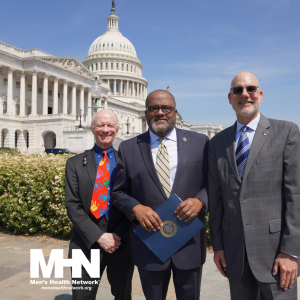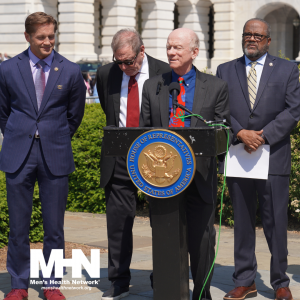Congressional Men’s Health Caucus Shows Bipartisan Consensus on Prevention, Mental Health, & Closing the Lifespan Gap
The leadership of the 2025 Congressional Men's Health Caucus announces plans for 2 resolutions drawing attention to life expectancy and men's health.
As an original and continuing partner to the Caucus, Men’s Health Network (MHN) joined the Caucus leadership to spotlight rising rates of preventable disease, the mental health crisis among men, and the widening lifespan gender gap, now over 5.3 years between men and women. Together, caucus leaders pledged to shift the conversation from reaction to prevention and from silence to empathy.
“We welcome the progress that has been made in women’s health, and we are working to help men learn from those successes.” Said Ronald Henry, President of Men’s Health Network. “Reducing premature death and disability among men isn’t just important for the men themselves; it’s important to the wives, sisters, and daughters who love them.”
Henry also addressed the rising gender gap in life expectancy, noting that it is not fixed or inevitable. “The Lifespan Gender Gap rises and falls over time with both medical advances and public health advances. From a peak of 7.7 years in 1979, the Lifespan Gender Gap was reduced by three full years to 4.7 years by 2010. Unfortunately, the Lifespan Gender Gap began growing again in 2015, and that is not good for any part of American society,” he said.
A Bipartisan Push for Prevention and Policy
“Men’s health isn’t a partisan issue—it’s a public health issue,” said Rep. Troy A. Carter, Sr. (D-LA), the new caucus chair. “This caucus is about saving lives, supporting families, and making sure men get the care, information, and encouragement they need to stay healthy.”
Carter, who assumed the caucus leadership following the passing of longtime advocate Rep. Donald Payne Jr., was joined by co-chairs Rep. Rich McCormick (R-GA), Rep. Rob Menendez (D-NJ), Rep. Ted Lieu (D-CA), and Rep. Neal Dunn, M.D. (R-FL). Their joint leadership signals a strong bipartisan commitment to advancing policies that promote better health for men, boys, and their families.
In addition to the resolutions and bills planned for filing, Carter previously introduced the Men’s Health Workforce Act, which expands access to mental health services in underserved communities and also co-leads the PSA Screening for HIMs Act with Dr. Dunn, a bill that would require insurance coverage for prostate cancer screenings for high-risk men.
Medical Voices and National Partners Weigh In
Rep. McCormick, an ER physician, pointed to the preventable nature of many chronic diseases facing men today—from obesity to renal failure—and called for a renewed national focus on daily fitness, screenings, and personal accountability.
About the Men’s Health Caucus
The Congressional Men’s Health Caucus brings together policymakers, medical professionals, and community leaders to promote awareness, education, and policy solutions that address the unique health needs of men and boys. Through efforts focused on prevention, mental health, early detection, and closing the lifespan gap, the caucus seeks to ensure that more men live longer, healthier lives.
About Men’s Health Network
Men’s Health Network (MHN) is a national nonprofit organization whose mission is to reach men, boys, and their families where they live, work, play, and pray. Since 1992, MHN has led the charge in public health education, community outreach, and policy advocacy to improve the health and well-being of males of all ages.
Learn more at www.MensHealthNetwork.org
Jennifer Thompson
Men's Health Network
communications|menshealthnetwork.org| |communications|menshealthnetwork.org
Visit us on social media:
LinkedIn
Instagram
Facebook
YouTube
X
Other
Legal Disclaimer:
EIN Presswire provides this news content "as is" without warranty of any kind. We do not accept any responsibility or liability for the accuracy, content, images, videos, licenses, completeness, legality, or reliability of the information contained in this article. If you have any complaints or copyright issues related to this article, kindly contact the author above.
Scalenut Launches AI Tools to Boost Visibility in Generative Search
Rocky Mountain AI Launches as New Colorado Nonprofit
Outsourcing accounts payable services reshape how USA builders manage finances
Więcej ważnych informacji
 Jedynka Newserii
Jedynka Newserii

 Jedynka Newserii
Jedynka Newserii

Problemy społeczne

Ślązacy wciąż nie są uznani za mniejszość etniczną. Temat języka śląskiego wraca do debaty publicznej i prac parlamentarnych
W Polsce 600 tys. osób deklaruje narodowość śląską, a 460 tys. mówi po śląsku. Kwestia uznania etnolektu śląskiego za język regionalny od lat wzbudza żywe dyskusje. Zwolennicy zmiany statusu języka śląskiego najbliżej celu byli w 2024 roku, ale nowelizację ustawy o mniejszościach narodowych i etnicznych zablokowało prezydenckie weto. Ostatnio problem wybrzmiał podczas debaty w Parlamencie Europejskim, ale zdaniem Łukasza Kohuta z PO na forum UE również trudna jest walka o prawa mniejszości etnicznych i językowych.
Transport
Polacy z niejednoznacznymi opiniami na temat autonomicznych pojazdów. Wiedzą o korzyściach, ale zgłaszają też obawy

Polacy widzą w pojazdach autonomicznych szansę na poprawę bezpieczeństwa na drogach i zwiększenie mobilności osób starszych czy z niepełnosprawnościami. Jednocześnie rozwojowi technologii AV towarzyszą obawy, m.in. o utratę kontroli nad pojazdem czy o większą awaryjność niż w przypadku tradycyjnych aut – wynika z prowadzonych przez Łukasiewicz – PIMOT badań na temat akceptacji społecznej dla AV. Te obawy wskazują, że rozwojowi technologii powinna także towarzyszyć edukacja, zarówno kierowców, jak i pasażerów. Eksperci mówią także o konieczności transparentnego informowania o możliwościach i ograniczeniach AV.
Prawo
70 proc. Polaków planuje wyjazd na urlop w sezonie letnim 2025. Do łask wracają wakacje last minute

Ponad 70 proc. Polaków planuje wyjechać na urlop w sezonie letnim, czyli między końcem czerwca a końcem września – wynika z badania Polskiej Organizacji Turystycznej. 35 proc. zamierza wyjechać tylko raz, a 30 proc. – co najmniej dwa razy. Z grupy wyjeżdżających jedna trzecia wybierze się na wyjazd zagraniczny. Jak wskazuje Katarzyna Turosieńska z Polskiej Izby Turystyki, po kilku latach ponownie do łask wracają oferty last minute, a zagraniczne kierunki pozostają niezmienne – prym wiodą m.in. Grecja, Tunezja, Egipt czy Hiszpania.
Partner serwisu
Szkolenia

Akademia Newserii
Akademia Newserii to projekt, w ramach którego najlepsi polscy dziennikarze biznesowi, giełdowi oraz lifestylowi, a także szkoleniowcy z wieloletnim doświadczeniem dzielą się swoją wiedzą nt. pracy z mediami.



![Nestlé w Polsce podsumowuje wpływ na krajową gospodarkę. Firma wygenerowała 0,6 proc. polskiego PKB [DEPESZA]](https://www.newseria.pl/files/1097841585/fabryka-nesquik_1,w_85,r_png,_small.png)






.gif)

 |
| |
| |
|